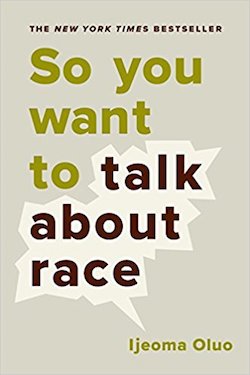Event of the Week: So You Want to Talk About Race at Elliott Bay Book Company
Ijeoma Oluo didn't ask to be Seattle's conscience. But often the most responsible, honest person in any given area is granted a role of community conscience - especially if they'd never asked for that role in the first place.
At times, it seems as though Oluo is biologically incapable of writing a dishonest word. She speaks the truth, clearly and repeatedly. She doesn't suffer fools. She speaks against injustice as often as she needs to, and the world is a very unjust place.
If that hackneyed old quantum theory of infinite universes is true, there's a universe somewhere out there in which Oluo doesn't have to work as a 24-hour truth-teller. In that universe, she films makeup tutorials on YouTube and she writes hilarious reviews and humorous personal essays.
But we live in a universe where everything feels wrong - where systematic racism and sexism has been normalized to the point that demanding equality is enough to mark you in the eyes of the mainstream as a crybaby or a reactionary. And because this is our universe, Ijeoma Oluo wrote her first book, So You Want to Talk About Race. (Oluo reads from the book at Elliott Bay Book Company this Wednesday.)

"Race is not something people can choose to ignore anymore," Oluo writes toward the beginning of Race. For too long in this country - and in Seattle - we've ignored race. White people have pretended that the "problem" has been "solved," that we're in a liberal utopia where race doesn't matter. But thanks to the megaphone of social media, we've learned that we haven't "solved" anything - we've just kept entire populations out of the conversation.
Oluo, to her credit, refuses to be dour, or lament her thankless role as someone who starts the uncomfortable conversations about race in the media. "I am so glad you are here," she tells the reader at the end of the first chapter of Race. "I am so glad that you are willing to talk about race. I'm honored to be a part of this conversation with you." It's a statement of genuine warmth, a generous welcome.
Race is a step-by-step guide to discussing race in America. It defines every term, and it starts on the ground floor. There's plenty of good, practical advice: if your conversation about race starts to go wrong, for example, and "If you are white," Oluo says, "watch how many times you say 'I' and 'me.'"
The book is conversational and Oluo is a disarming host. Rather than open her conversation of privilege with a host of bad examples, for instance, Oluo dissects all the privilege in her life that has led to her publishing her first book. The word that comes to mind, again, is "generous."
By the time Oluo has moved into the most controversial topics of our time - police brutality, cultural appropriation, so-called "callout culture" - she has disarmed all but the most hateful readers. Race is exactly what she promised the book to be - a conversation, one that draws in a reader and engages their ideas with a thorough and loving series of questions.
Elliott Bay Book Company, 1521 10th Ave, 624-6600, http://elliottbaybook.com, 7 pm, free.